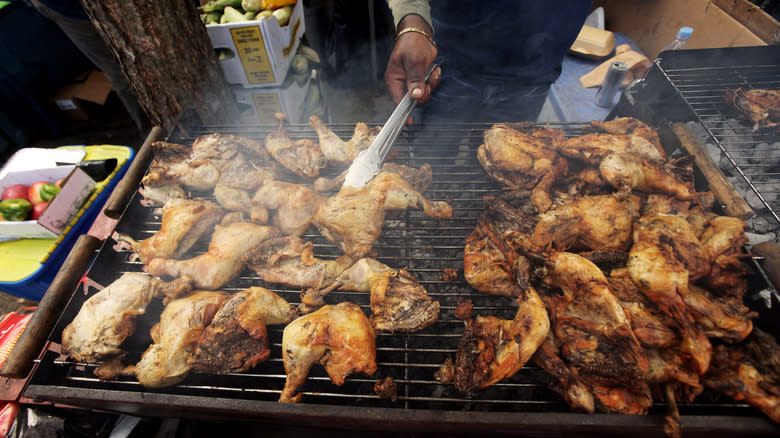The History Of Cornell Chicken Begins At Its Prestigious Namesake

As its name suggests, Cornell chicken is the invention of a Cornell professor and food scientist who used his degree and love for the upstate New York poultry farming community as inspiration. Cornell chicken consists of chicken halves roasted on the grates of a coal-fired pit and basted with a marinade of egg, oil, vinegar, poultry seasoning, salt, and pepper. The chicken is flipped every so often over the span of an hour and is basted at every turn.
The story of Cornell chicken dates back to the 1940s and 50s when poultry and food science professor Robert Baker concocted the now state-famous sauce and baste-and-flip cooking method for chicken. As a poultry science professor, Baker wanted to support the economy of local poultry farmers by creating a novel recipe to reinvigorate chicken's appeal.
His food science knowledge came into play with the basting recipe, reasoning that eggs act as both a binding agent and an emulsifier. Eggs will ensure that the seasonings stick to the skin while helping the oil and vinegar not to separate. Baker also argued that the vinegar will kill any bacteria born from using raw eggs, making the sauce reusable. He even designed a scalable recipe model so that the chicken could be mass-produced, which he tested at the annual state fair. His chicken stand, Baker's Chicken Coop, remained a state fair favorite for 70 years.
Read more: 12 Different Ways To Cook Chicken
Cornell Chicken And Robert Baker's Legacy

Not only is Cornell chicken still a beloved state-fair staple, but the recipe itself is a mainstay at backyard barbecues and restaurants around New York. The recipe has also garnered praise from lofty culinary publications like the New York Times, while Baker's Chicken Coop has attracted famous state fair visitors like former President Bill Clinton and his family. While the original recipe still reigns supreme, some chefs have made upgrades like subbing half the salt for minced, fresh garlic. You can also make a vegetarian Cornell chicken by swapping half birds for tofu steaks or oyster mushrooms.
Baker's legacy isn't limited to Cornell chicken. He also pioneered numerous processed poultry products like chicken bologna, turkey ham, and most famous of all, the almighty chicken nugget. He even revolutionized the packaging and shipping industry with vacuum and atmosphere packaging.
Baker died in 2006 at the age of 84, but his children and grandchildren ran the wildly popular state fair stand for 70 years until calling it quits in 2021. In a poetic remembrance of Baker, his memorial service was preceded by a city-wide Cornell chicken barbecue.
Read the original article on Tasting Table


